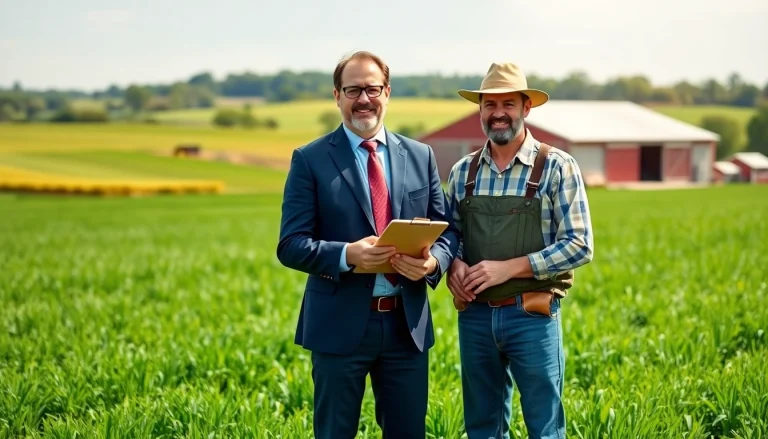Introduction to Agricultural Law
Agricultural law encompasses a complex web of regulations governing agriculture, food production, and related industries. From crop cultivation to livestock management, this legal framework affects farmers, agribusinesses, and consumers alike. The field of agricultural law facilitates the management of various issues that arise within this vital sector, contributing to its sustainability and overall effectiveness. Understanding agricultural law is crucial for anyone involved in farming or food production, as it directly influences their operations and decisions.
What is Agricultural Law?
Agricultural law is the study of the laws and regulations unique to agriculture and agri-food systems. This area of law encompasses a wide range of topics, including land use, labor rights, environmental protections, and consumer safety. In essence, agricultural law serves as a specialized body of law aimed at addressing the unique challenges faced by those involved in farming and food production. It intricately blends aspects of property law, contract law, tax law, and environmental law, creating a distinctive legal landscape tailored for agricultural practices.
Importance of Agricultural Law for Farmers
For farmers, understanding agricultural law is essential to navigating the complexities of modern agricultural practices. The law governs essential aspects such as land tenure, water rights, environmental regulations, and food safety protocols. Awareness of these legal frameworks enables farmers to protect their rights, optimize their operations, and mitigate risks associated with legal complications.
Scope and Focus of Agricultural Law
The scope of agricultural law extends to various sectors including crop production, livestock management, agribusiness, and food processing. This area of law addresses topics such as land leases, rural development, animal welfare, and health regulations governing food products. Its focus encompasses a myriad of legal issues that impact the agricultural industry at local, state, and federal levels, ensuring that farmers can operate within a sustainable and legally compliant framework.
Key Areas Covered in Agricultural Law
Property Rights and Land Use
A cornerstone of agricultural law is the regulation of property rights and land use. Land is a farmer’s most critical asset; therefore, understanding property rights is essential to efficient agricultural operations. This includes issues related to land ownership, zoning laws, and land leasing agreements. Farmers must be acutely aware of their legal rights in relation to land use, as these factors can influence the viability of their farms.
Regulations on Food Safety and Quality
The agricultural law framework imposes stringent regulations aimed at ensuring food safety and quality. Regulatory bodies set forth safety standards that agribusinesses must adhere to, covering areas such as pesticide use, food processing practices, and inspection protocols. Compliance with these regulations not only safeguards consumers but also enhances the reputation of agricultural operations, thereby fostering consumer trust in food products.
Environment and Agricultural Law
The intersection of environment and law is a critical aspect of agricultural regulation. Environmental laws regulate practices that affect soil, water, air quality, and biodiversity. It is imperative for farmers to understand environmental regulations to protect their land and resources while also complying with federal and state mandates on land stewardship, conservation practices, and sustainable agriculture. Failure to adhere to these regulations may result in severe penalties and long-term ramifications for the environment and the farming community.
Common Challenges in Agricultural Law
Liability Issues in Farming
Farmers often face liability challenges due to the nature of their operations, which can involve accidents and injuries. Liability issues can arise from negligence, product liability, or workers’ compensation claims. Understanding legal responsibilities and liability coverage is essential for farmers to mitigate risks and ensure financial security in the face of potential legal actions.
Compliance with Environmental Regulations
As agricultural operations increasingly come under scrutiny due to environmental concerns, compliance with environmental regulations is more important than ever. This requires farmers to maintain thorough records, stay informed about evolving laws, and implement sustainable practices. Non-compliance can result in fines, lawsuits, and damage to a farmer’s reputation, making it imperative to prioritize environmental stewardship.
Handling Disputes in Agricultural Contracts
Disputes can frequently arise in agricultural contracts, whether related to land leases, financing agreements, or partnerships. Effective dispute resolution strategies, such as negotiation or mediation, can help mitigate conflicts before they escalate to legal battles. Familiarity with legal rights and obligations under contract law is critical for farmers to successfully navigate and resolve disputes when they occur.
Best Practices for Navigating Agricultural Law
Working with Legal Professionals
One of the most effective ways for farmers to navigate agricultural law is by collaborating with legal professionals specializing in agricultural affairs. Attorneys with expertise in this field can provide guidance on regulatory compliance, contract negotiation, and dispute resolution. Investing in legal consultation can prevent costly legal issues and ensure farm operations remain compliant with applicable laws.
Staying Updated on Legal Changes and Trends
The evolution of laws and regulations in agriculture is constant, necessitating farmers to remain informed about any changes that may affect their operations. Subscribing to industry newsletters, attending legal seminars, and participating in agricultural associations can help farmers stay abreast of legal trends and developments that may impact their work.
Utilizing Resources and Support Networks
Farmers should take advantage of available resources and support networks designed to offer guidance on agricultural law issues. Organizations such as agricultural associations, legal aid clinics, and extension services provide valuable information and assistance to navigate the intricate landscape of agricultural law. Building relationships within the agricultural community can also facilitate knowledge sharing and collective problem-solving.
Future Trends in Agricultural Law
Impact of Climate Change on Agricultural Law
As climate change continues to affect agricultural practices worldwide, its legal implications cannot be overlooked. New legislation may emerge to address climate-related challenges such as drought, flooding, and crop resilience. Future laws could incentivize sustainable practices and require regulatory compliance measures aimed at mitigating climate risks. Farmers should prepare for potential changes in legislation that aim to balance agricultural productivity with environmental stewardship.
Technological Advances in Farming and Legal Implications
Technological advancements in agriculture, including precision farming, biotechnology, and data analytics, are transforming the industry. However, these innovations also introduce new legal considerations around intellectual property rights, data privacy, and liability for technological failures. As technology continues to evolve, so too will the legal frameworks governing its use in agriculture, requiring farmers to stay informed about pertinent legal developments.
Global Trends and International Agricultural Law
The globalization of agricultural markets has led to the emergence of international agreements and standards affecting food production and trade. Understanding international agricultural law is crucial for farmers engaged in export activities or those looking to capitalize on global markets. Compliance with international regulations can enhance market access, reduce trade barriers, and promote fair competition in a globalized agricultural economy.




















+ There are no comments
Add yours